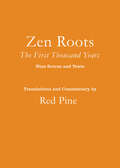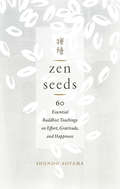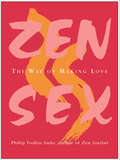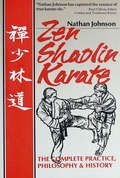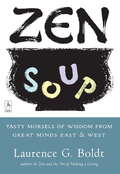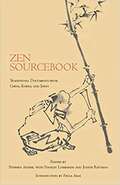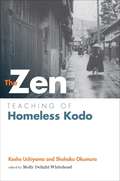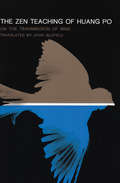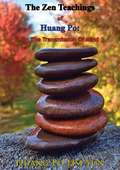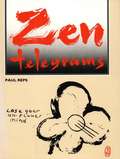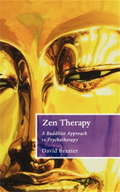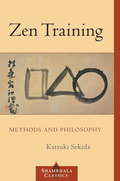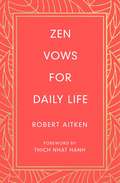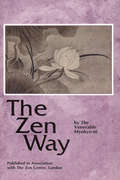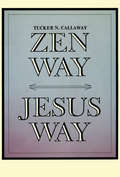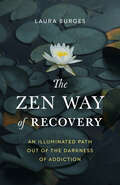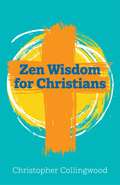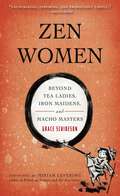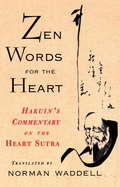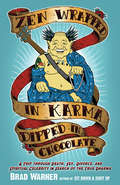- Table View
- List View
Zen Roots: The First Thousand Years
by Red PineIncluding nine new translations from the first thousand years of Zen, this collection of sacred Buddhist texts with refreshed commentary is made to be carried with you Dating from the middle of the second century B.C. to the middle of the ninth century A.D., Zen Roots includes the Heart, Diamond, and Platform sutras; selections from the Vimalakirti and Lankavatara sutras; Bodhidharma's Principles & Practice; Sengcan's Trusting the Mind; Yongjia&’s Song of Enlightenment; and Huangbo's Transmission of the Mind.These translations are accompanied by introductions and enough notes to explain what needs explaining but not so many as to get in the way. Zen Roots is the perfect companion for travel, to accompany one to the higher elevations, or just to read in the backyard.
Zen Seeds: 60 Essential buddhist Teachings on Effort, Gratitude, and Happiness
by Shundo AoyamaFrom a living treasure of Japanese Zen, an inspiring collection of teachings about the power of Buddhist practice to help you transform suffering and touch the marrow of your life.In this sparkling collection of teachings, Japanese Zen master Shundo Aoyama Roshi offers an entry to the authentic practice of Zen Buddhism. Or, rather, she offers a myriad of entries—for Zen Seeds, as its title suggests, is comprised of brief chapters meant to plant seeds of wisdom and compassion in readers. Ranging from classical Zen sources, such as the teachings of Dogen and the encounter stories of the koans, to anecdotes from Aoyama’s fascinating life and from those of her many students, the book paints a profoundly compelling portrait of the transformative possibilities of Zen. A pioneering female leader in the Soto Zen school, Aoyama Roshi demonstrates the power of practice for anyone seeking to lead a life of greater conviction and spiritual nourishment.
Zen Sex: The Way of Making Love
by Philip Toshio Sudo“[O]ffers broad principles to augment sexual pleasure...” — Publisher's Weekly“Zen Sex ... makes a good case for the transcendent communion that can take place in the act of making love.” — Spirituality and Health magazine“A gentle and thoughtful book about sex and its place in a full life.” — Kirkus Reviews
Zen Shaolin Karate
by Nathan JohnsonIn Zen Shaolin Karate, Johnson explains and illustrates in precise detail every subtle movement of two of karate's most common kata, and provides historical testimony for his explanations by integrating his findings with Zen philosophy. The author's unique interpretations of the Nai Fuan Chin and Saam Chin kata will destroy the barriers separating karate, kung fu, and aikido, and will revolutionize how kata are applied in all karate styles.
Zen Shaolin Karate
by Nathan JohnsonIn Zen Shaolin Karate, Johnson explains and illustrates in precise detail every subtle movement of two of karate's most common kata, and provides historical testimony for his explanations by integrating his findings with Zen philosophy. The author's unique interpretations of the Nai Fuan Chin and Saam Chin kata will destroy the barriers separating karate, kung fu, and aikido, and will revolutionize how kata are applied in all karate styles.
Zen Soup (Compass)
by Laurence G. BoldtIf, as the I Ching says, thoughts are spirits, then this collection of highly distilled thoughts from history?s greatest philosophers and religious figures will certainly put you in good spirits. <P><P>Laurence Boldt has long made a practice of applying Zen principles to everyday life. Here he applies wisdom from all corners of the world to twenty-five aspects, or qualities, associated with the Zen tradition. The result is a soup of the most hearty and wholesome kind, well-seasoned with age, and filled with delicious surprises: ?Where your talents and the needs of the world cross, thence lies your vocation.? --Aristotle ?A man with outward courage dares to die: A man with inward courage dares to live.? --Lao Tzu You?ll also find Flip Wilson on living in the moment; Will Rogers on the beginner?s mind; Helen Keller on courage; Chekhov on self-confidence; and Colette on joy. Each chapter includes an entertaining and informative essay that explains the principle and its application to Zen wisdom. The rest is up to you. Read it in one gulp or savor each morsel. Either way, Zen Soup is sure to whet your spiritual appetite as it nourishes your soul.
Zen Sourcebook: Traditional Documents From China, Korea, And Japan
by Stephen Addiss Stanley Lombardo Judith Roitman Paula Arai"Featuring a carefully selected collection of source documents, this tome includes traditional teaching tools from the Zen Buddhist traditions of China (Ch'an), Korea (Son), and Japan (Zen), including texts created by women. The selections provide both a good feel for the varieties of Zen and an experience of its common core. . . . The texts are experiential teachings and include storytelling, poetry, autobiographies, catechisms, calligraphy, paintings, and koans (paradoxical meditation questions that are intended to help aspirants transcend logical, linguistic limitations). Contextual commentary prefaces each text. Wade-Giles transliteration is used, although Pinyin, Korean, Japanese, and Sanskrit terms are linked in appendixes. An insightful introduction by Arai contributes a religious studies perspective. The bibliography references full translations of the selections. A thought-provoking discussion about the problems of translation is included. . . . Summing Up: Highly recommended. All levels." --Choice
Zen Teaching of Homeless Kodo
by Kosho Uchiyama Roshi Shohaku Okumura Jokei Molly WhiteheadAbandon your treasured delusions and hit the road with one of the most important Zen masters of twentieth-century Japan.Eschewing the entrapments of vanity, power, and money, "Homeless" Kodo Sawaki Roshi refused to accept a permanent position as a temple abbot, despite repeated offers. Instead, he lived a traveling, "homeless" life, going from temple to temple, student to student, teaching and instructing and never allowing himself to stray from his chosen path. He is responsible for making Soto Zen available to the common people outside of monasteries. His teachings are short, sharp, and powerful. Always clear, often funny, and sometimes uncomfortably close to home, they jolt us into awakening. Kosho Uchiyama expands and explains his teacher's wisdom with his commentary. Trained in Western philosophy, he draws parallels between Zen teachings and the Bible, Descartes, and Pascal. Shohaku Okumura has also added his own commentary, grounding his teachers' power and sagacity for the contemporary, Western practitioner. Experience the timeless, practical wisdom of three generations of Zen masters.
The Zen Teaching of Huang Po: On the Transmission of Mind (Books That Changed the World)
by Huang PoThis complete collection of teachings by the 9th century Zen Master has been an essential text in the study of Zen for centuries—now available in English.This translation of the original collection of sermons, dialogues, and anecdotes of Huang Po, the illustrious Chinese master of the Tang Dynasty, allows the Western reader to gain an understanding of Zen from the original source, one of the key works in its teachings. It also offers deep and often startling insights into the rich treasures of Eastern thought. Nowhere is the use of paradox in Zen illustrated better than in the teaching of Huang Po, who is regarded as the founder of the great Lin Chi sect. He demonstrates that the experience of intuitive knowledge, which reveals to a man what he is, cannot be communicated in words. With the help of these paradoxes, beautifully and simply presented in this collection, Huang Po could set his disciples on the right path. It is in this fashion that the Zen master lead his listener into truth, often by a single phrase designed to destroy his particular demon of ignorance.John Blofeld’s translation reflects his deep understanding of Zen and gives this historical text a clear and faithful presentation.
The Zen Teachings of Huang Po: On The Transmission Of Mind
by John Blofeld P’ei Hsiu Huang Po His YunThis Historical text from the direct teaching of the Zen master, Huang Po, allows the Western reader to gain an understanding of Zen from the original source, one of the key works in its teachings; it also offers deepening and often startling insights into the rich treasures of Eastern thought.Huang Po, also known as Hsi Yun, is believed to have died as late as 850 A.D. He is regarded in a sense as the founder of the great Lin Chi sect. He lived below the Vulture Peak on Mount Huang Po, in the district of Kao An. Like most Zen masters, Huang Po taught in parables which were delivered as sermons, anecdotes, and dialogues. These have been collected here to present the teachings of the Master himself. He compares the mind to the sun travelling through the sky, sending forth light uncontaminated by the finest particle of dust. For those who have discovered the nature of Reality, he says, there is nothing old or new, concepts become meaningless and reason leads to error.Nowhere is the use of paradox in Zen illustrated better than in the teachings of Huang Po, who shows how the experience of intuitive knowledge which reveals to a man what he really is, cannot be communicated by words. With the help of these paradoxes, beautifully and simply presented in this collection, Huang Po could set his disciples on the right path. It is in this fashion that the Zen master leads his listener into the truth, often by a single phrase designed to destroy his particular demon of ignorance.Many of the dialogues recorded in The Zen Teaching of Huang Po took place in public assembly, generally with hundreds of the Master's followers in attendance. This text is remarkable for its purity of thought and speech. John Blofeld's translation reflects his deep understanding of Zen and gives it a crystal clear presentation. In addition, there are an introduction and explanatory notes that make this original and revered text even more valuable to the contemporary reader.
Zen Telegrams
by Paul RepsZen Telegrams is a collection of Reps's picture-poems," works of calligraphic art and minimalist poetry that first fascinated Japanese,then attracted Western viewers. A lesser artist trying to combine English text and Eastern art might have failed, but Reps was a rare talent, accomplished in a wide variety of literary genres and art forms and his unique work appeals to a universal audience.
Zen Telegrams
by Paul RepsZen Telegrams is a collection of Reps's picture-poems," works of calligraphic art and minimalist poetry that first fascinated Japanese,then attracted Western viewers. A lesser artist trying to combine English text and Eastern art might have failed, but Reps was a rare talent, accomplished in a wide variety of literary genres and art forms and his unique work appeals to a universal audience.
Zen Therapy: A Buddhist approach to psychotherapy
by David BrazierBuddhism, from Abhidharma to Zen, offers a practical path to harmony of head and heart. For over 2,000 years Buddhists have been developing sophisticated psychologies to guide the work of achieving freedom from mental suffering. Now East and West are beginning to learn from each other. In a readable and practical manner, this book challenges basic assumptions of Western psychology, demystifies Buddhist psychology and presents Zen as a therapy. Giving examples of its effectiveness in psychotherapeutic practice, the author shows how Zen derives from the Buddhist theory of the mind and throws new light upon the Buddhist theory of relations and conditions. This seminal wok is a resource full of intriguing and controversial ideas.
Zen Therapy: A Buddhist approach to psychotherapy
by David BrazierBuddhism, from Abhidharma to Zen, offers a practical path to harmony of head and heart. For over 2,000 years Buddhists have been developing sophisticated psychologies to guide the work of achieving freedom from mental suffering. Now East and West are beginning to learn from each other. In a readable and practical manner, this book challenges basic assumptions of Western psychology, demystifies Buddhist psychology and presents Zen as a therapy. Giving examples of its effectiveness in psychotherapeutic practice, the author shows how Zen derives from the Buddhist theory of the mind and throws new light upon the Buddhist theory of relations and conditions. This seminal wok is a resource full of intriguing and controversial ideas.
Zen Training: Methods and Philosophy
by Katsuki SekidaZen Training is a comprehensive handbook for zazen, seated meditation practice, and an authoritative presentation of the Zen path. The book marked a turning point in Zen literature in its critical reevaluation of the enlightenment experience, which the author believes has often been emphasized at the expense of other important aspects of Zen training. In addition, Zen Training goes beyond the first flashes of enlightenment to explore how one lives as well as trains in Zen. The author also draws many significant parallels between Zen and Western philosophy and psychology, comparing traditional Zen concepts with the theories of being and cognition of such thinkers as Heidegger and Husserl.
Zen Vows for Daily Life
by Robert Aitken Thich Nhat HanhA poetic classic from a major figure of American Zen.Zen Vows for Daily Life is a collection of gathas, vows in verse form for daily practice, similar to prayers or affirmations for use at home, at work, and in the meditation hall itself. Reciting these poetic vows can help us be fully present in each moment and each activity of our lives. These gathas serve as gentle reminders to return again and again to our highest aspirations, with acceptance, joy, and compassion—for ourselves and all beings. Zen Vows for Daily Life will be a steadfast companion in keeping the reader inspired and committed on their spiritual path. “Each act in a Buddhist monastery—washing up, putting on clothes, entering the Buddha hall, sitting down for meditation, getting up from meditation—receives its own Dharma poem. Events on pilgrimage—encountering a tree, a river, a bridge, a dignitary, a mendicant—likewise offer entries into truth. My purpose in this book is similar: to show how ordinary occurrences in our modern lay lives are in fact the Buddha’s own teachings—and also to show how we can involve ourselves accordingly in the practice of wisdom and compassion with family and friends, with everyone and everything.”—Robert Aitken, from the Preface “In [Zen Vows for Daily Life], poetry and meditation always go together. Poetry is comprised of images and music, and images make the practice easy. Robert Aitken Roshi is a poet who deeply appreciates practicing with these gathas. He offers us many beautiful verses, sterling examples of this practice, that we can use to reflect more deeply on what we are doing. I am grateful to Aitken Roshi for offering us this beautiful book.”—from the Foreword by Thich Nhat Hanh
Zen War Stories (Routledge Critical Studies in Buddhism)
by Brian VictoriaFollowing the critically acclaimed Zen at War (1997), Brian Victoria explores the intimate relationship between Japanese institutional Buddhism and militarism during the Second World War.Victoria reveals for the first time, through examination of the wartime writings of the Japanese military itself, that the Zen school's view of life and death was deliberately incorporated into the military's programme of 'spiritual education' in order to develop a fanatical military spirit in both soldiers and civilians. Furthermore, that D. T. Suzuki, the most famous exponent of Zen in the West, is shown to have been a wartime proponent of this Zen-inspired viewpoint which enabled Japanese soldiers to leave for the battlefield already resigned to death. Victoria takes us onto the naval battlefield in the company of warrior-monk and Rinzai Zen Master Nakajima Genjô. We view the war in China through the eyes of a Buddhist military chaplain. The book also examines the relationship to Buddhism of Japan's seven Class-A war criminals who were hung by the Tokyo War Crimes Tribunal in 1948.A highly controversial study, this book will be of interest, first and foremost, to students of Zen as well as all those studying the history of this period, not to mention anyone concerned with the perennial question of the 'proper' relationship between religion and the state.
The Zen Way
by Myokyo-NiMyokyo-ni is the Buddhist name of Dr. Irmgard Schloegl, who directs the Zen center Shobo-an in London. Here she seeks to describe Zen and Zen practice from a few different approaches, presenting basic Buddhist thought as well as an overview of the life of the historical Buddha. She gives a section on training in a Japanese Rinzai Zen monastery-perhaps the most unique feature of the book, although her presentation is rather impersonal. Her final section, "Fundamentals," is rambling and might have benefited from further organization and subdivision. The author's style throughout is decidedly Western, with a psychological, philosophical tone that does not sit comfortably with some of the more esoteric writings in the field. For an introduction to the subject, there are better sources, such as Robert Aitken's Taking the Path of Zen (Farrar, 1982). For serious students of Zen, there are valuable insights hidden in the sometimes difficult but heartfelt analyses scattered through the book.
The Zen Way
by Myokyo-NiMyokyo-ni is the Buddhist name of Dr. Irmgard Schloegl, who directs the Zen center Shobo-an in London. Here she seeks to describe Zen and Zen practice from a few different approaches, presenting basic Buddhist thought as well as an overview of the life of the historical Buddha. She gives a section on training in a Japanese Rinzai Zen monastery-perhaps the most unique feature of the book, although her presentation is rather impersonal. Her final section, "Fundamentals," is rambling and might have benefited from further organization and subdivision. The author's style throughout is decidedly Western, with a psychological, philosophical tone that does not sit comfortably with some of the more esoteric writings in the field. For an introduction to the subject, there are better sources, such as Robert Aitken's Taking the Path of Zen (Farrar, 1982). For serious students of Zen, there are valuable insights hidden in the sometimes difficult but heartfelt analyses scattered through the book.
Zen Way - Jesus Way
by Tucker N. CallawayThis groundbreaking book successfully fuses the two overlapping traditions of Zen Buddhism and Christianity.Very few Christians who are interested in Zen Buddhism understand the fundamentals of the religion itself. <P><P>Most of the books which are available on Zen are superficial and fraught with caricatures and erroneous generalizations - concentrating more on meditation than on the real essence of Zen. Now the Christian who has been waiting for a clear and thorough explanation of Zen in terms he can understand has been provided with Zen Way--Jesus Way--a unique inside look at Christianity and Zen Buddhism by Dr. Tucker N. Callaway, a committed Christian missionary who for twenty years has practiced zazen in Japanese temples in an effort to reach the heart of the faith.Calloway has a knack for making philosophical concepts clear to the general reader and begins Zen Way--Jesus Way by presenting the fundamental presuppositions of Zen and several of the concepts which are logically deduced from them. Next he relates some of his experiences in Buddhist temples, while explaining the practical applications of Zen philosophy. Finally he interprets the Jesus Way in a manner that makes possible a genuine comparison with the Zen way.
The Zen Way of Recovery: An Illuminated Path Out of the Darkness of Addiction
by Laura BurgesAn accessible, compassionate guide to Buddhist principles and practices that can help support recovery from addictions and addictive behaviors—written by an experienced lay teacher with long-term recovery.For anyone struggling with addiction, Buddhism offers powerful, grounding wisdom and tools to help support recovery. In The Zen Way of Recovery, Laura Burges shares her experience as a dedicated Zen practitioner who came to terms with her own addiction to alcohol and found support for her recovery. Through the lens of Buddhist teachings, Burges offers tools and practices which, together with the help of recovery programs, can offer a road to sobriety. Burges is an experienced and compassionate guide, and her message is resonant for people with any type of addictive behavior—and for people who aren&’t necessarily familiar with Buddhism. Her teachings are drawn from the Buddha's life and teachings (specifically the Eight Awarenesses of the Awakened Being and the Six Paramitas), and the wisdom of Japanese Buddhist priest Dogen Zenji, the founder of the Soto school of Zen, among others. Burges emphasizes the importance of being in an active recovery program, and the teachings and practices she offers in each chapter—including reflections, journaling prompts, meditations, instructions for setting up and altar and zazen—are both a perfect adjunct and powerful reinforcement. Examples of reflections and journaling prompts include: Do you still hear the critical, contemptuous, sarcastic voice of a parent or partner in your own head?Do you sometimes hear yourself mirroring this negative voice with others?What were the models of relationship that you grew up with?What are ways that you can cultivate more patience?Check in with yourself to see if tiredness, hunger, loneliness, or anger is affecting your thinking in the moment.
Zen Wisdom for Christians
by Christopher CollingwoodAs spiritual paths, Zen and Christianity can learn from one another. In this book, Anglican priest and Zen teacher Christopher Collingwood sets out how Zen can return Christians to their roots with renewed energy, and allow others to consider Christianity in a new and more favourable light. For the many Christians searching for a greater depth of spirituality, Zen offers a way to achieve openness. Drawing on Zen experience and the teachings of Jesus as depicted in the gospels, Zen Wisdom for Christians enables Christians to explore avenues of thought and experience that are fresh and creative. Using examples of Zen koans and Zen readings of Christian texts, the author provides a radical reorientation of life - away from one based on self-centredness and the notion of a separate, isolated self, to a way that is inclusive and at one with all.Zen Wisdom for Christians proves that the practice of Zen can lead Christians towards deeper spirituality and enhance religious experience through mutual appreciation, in a way that is truly eye-opening and life-changing.
Zen Women
by Miriam Levering Grace SchiresonThis landmark presentation at last makes heard the centuries of Zen's female voices. Through exploring the teachings and history of Zen's female ancestors, from the time of the Buddha to ancient and modern female masters in China, Korea, and Japan, Grace Schireson offers us a view of a more balanced Dharma practice, one that is especially applicable to our complex lives, embedded as they are in webs of family relations and responsibilities, and the challenges of love and work. Part I of this book describes female practitioners as they are portrayed in the classic literature of "Patriarchs' Zen"--often as "tea-ladies," bit players in the drama of male students' enlightenments; as "iron maidens," tough-as-nails women always jousting with their male counterparts; or women who themselves become "macho masters," teaching the same Patriarchs' Zen as the men do. Part II of this book presents a different view--a view of how women Zen masters entered Zen practice and how they embodied and taught Zen uniquely as women. This section examines many urgent and illuminating questions about our Zen grandmothers: How did it affect them to be taught by men? What did they feel as they trying to fit into this male practice environment, and how did their Zen training help them with their feelings? How did their lives and relationships differ from that of their male teachers? How did they express the Dharma in their own way for other female students? How was their teaching consistently different from that of male ancestors? And then part III explores how women's practice provides flexible and pragmatic solutions to issues arising in contemporary Western Zen centers.
Zen Words for the Heart: Hakuin's Commentary on the Heart Sutra
by Norman Waddell HakuinHakuin Zenji (1689-1769) was one of the most important of all Japanese Zen masters. His commentary on the Heart Sutra is a Zen classic that reflects his dynamic teaching style, with its balance of scathing wit and poetic illumination of the text. Hakuin's sarcasm, irony, and invective are ultimately guided by a compassion that seeks to dislodge students' false assumptions and free them to realize the profound meaning of the Heart Sutra for themselves. The text is illustrated with Hakuin's own calligraphy and brush drawings.
Zen Wrapped in Karma Dipped in Chocolate
by Brad WarnerHow does a real-life Zen master -- not the preternaturally calm, cartoonish Zen masters depicted by mainstream culture -- help others through hard times when he's dealing with pain of his own? How does he meditate when the world is crumbling around him? Is meditation a valid response or just another form of escapism? These are the questions Brad Warner ponders in Zen Wrapped in Karma Dipped in Chocolate. During a year that Warner spent giving talks and leading retreats across North America, his mother and grandmother died, he lost his dream job, and his marriage fell apart. In writing about how he applied the Buddha's teachings to his own real-life suffering, Warner shatters expectations, revealing that Buddhism isn't some esoteric pie-in-the-sky ultimate solution but an exceptionally practical way to deal with whatever life dishes out.
